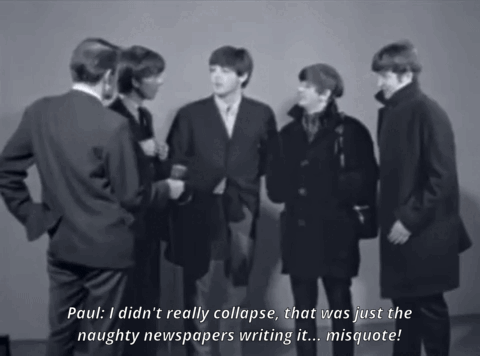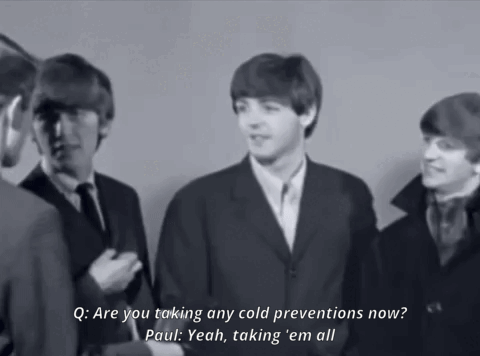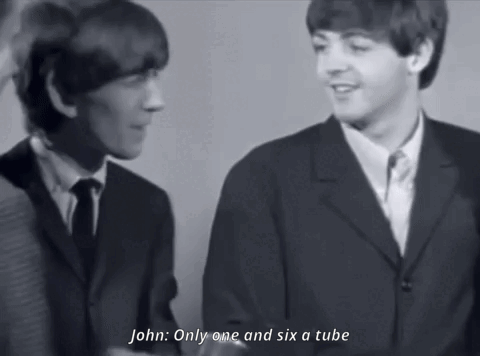#must be a preludin reference right?
Explore tagged Tumblr posts
Text






The Beatles interviewed by Stuart Hutchison for 'Move Over, Dad' in Plymouth, 13th November 1963 - part 1 (part 2, part 3, part 4) (x)
#john always there with a drugs joke#must be a preludin reference right?#love the way the others laugh at the idea of paul's collapse#wasn't so funny yesterday though was it johnny?#and it's not suspicious at all how john is now ill#I'm sure he just took really good care of him#really good#paul mccartney#john lennon#george harrison#ringo starr#the beatles#november 1963 was just the best month#november 1963#it was sixty years ago today#javelin's gifs
251 notes
·
View notes
Text
Lewisohn: rewriting history in the area where we trust him most – the songs performed
-In which Lewisohn rewrites a Beatles story and completely changes the songs sung, and coincidentally changes them in such a way so that if you know your Beatles trivia you'll think that Paul completely hogged the mic for two-thirds of the show-
Although I’ve come to a place where I’m more surprised to find a Lewisohn quote that turns out to be accurate than I am one that’s butchered, I have tended to believe that he is trustworthy on things like dates and songs performed. I’ve felt like that’s probably his anchor, and that he shapes the rest of his narrative around that.
But perhaps the habit of taking license cannot help but spread into other areas, because I am discovering that neither dates nor song lists turn out to be sacred with Mark Lewisohn.
As far as dates, that is part of a bigger piece that has been tangling me up for a few weeks, but his version of “the Beatmakers” performance shows that Mark Lewisohn will write what he wants, and that he has zero compunction in changing history to suit himself, regardless of subject.
In Chapter 22: “Right then, Brian — Manage Us,” a primary theme is that every promoter was done with the Beatles when Brian Epstein came along. Brian Kelly, especially, is given the role of being fed up with them, and Lewisohn uses “the Beatmakers” performance—Gerry and the Pacemakers and the Beatles going on stage together—as an example of how bad everything was just before Brian stepped in. (I do believe that Brian was a godsend, but that doesn’t mean that Lewisohn’s narrative is supported in every area, and in some places he stretches a lot more than in others. This is definitely one of those areas.)
Here’s the story: before going to the Litherland Town Hall performance, Bob Wooler had been drinking, maybe with the Beatles, and in Lewisohn’s version, Gerry seeing that they were all drunk sent “Gerry Marsden scuttling to the pub around the corner.” Every telling I’ve seen, one way or another, is in agreement that Gerry Marsden as well as Wooler had been drinking, and that the Pacemakers and the Beatles all played together with Wooler introducing them as “the Beatmakers.” Lewisohn adds some highly unlikely Preludin into the mix—“John, pissed and pilled…”—but I’m not going to take that on here.
Along with the chance to tell a riotously colorful story—one that in Lewisohn’s telling goes much farther than any of the source materials I’ve found—the main point of the tale is for Wooler to give us the climax of the—(all unsourced, other than this single, butchered Wooler quote)—frustration Lewisohn tells us promoter Brian Kelly was feeling: “Brian Kelly was fraught with anxiety over it. It was only a short episode and a bit of a shambles.”
The quote by Wooler that Lewisohn uses to try to prove his point, and the one and only reference he gives to support any of his “Brian Kelly fed up/Epstein must save Beatles” narrative is a modification of one of those Lewisohn monsters I call a “donut.” (There’s a hole in the middle. However in this case, as in many others, he also adds words that were never spoken.)
THE ACTUAL WOOLER QUOTE:
“Brian Kelly was fraught with anxiety over it, but the audience liked it. It was a bit of a shambles really, so I lowered the curtain on the proceedings.”
LEWISOHN’S REWRITE:
“Brian Kelly was fraught with anxiety over it. It was only a short episode and a bit of a shambles.”
And while I am very interested in what Lewisohn is using for his Brian-Epstein-saved-the-Beatles-but-Paul-tried-to-thwart-him narrative, I felt the need to pause to look at Lewisohn’s massive and nonsensical alterations to this performance, especially in the songs the improvised combo-band played. (And yet how very authoritatively Lewisohn does it.)
The whole section has problems, but let us deal with the songs.
Mark Lewisohn says they “thundered through four numbers”—
The Beatmakers thundered through four numbers—“Whole Lotta Shakin’ Goin’ On,” “What’d I Say” (extended mix), “Red Sails in the Sunset” and the new Ray Charles record “Hit the Road Jack”—during which John, pissed and pilled, slid from the piano and slumped on the stage.
—‘Tune In,’ Lewisohn – Chapter 22 (Emphasis mine.)
Sticking to the songs, the page referenced in the footnote first quotes Bob Wooler:
“They did a few numbers like ‘Hit The Road Jack’, swopping instruments and the like.”
—FOOTNOTE 9: ‘The Best of Fellas’ – Bob Wooler (Emphasis mine)
Then the next paragraph quotes Gerry Marsden, and I’m going to add boldface to the songs he says they played:
“It worked very well as we all knew the same songs and all played the same songs. Paul, John and I took turns on the piano and Les played the sax. We did ‘Roll Over Beethoven’, ‘Johnny B. Goode’, ‘Great Balls Of Fire’, ‘Pretend’, ‘Blueberry Hill’, ‘I’m Walkin'’ and ‘Sweet Little Sixteen’, probably some others too.”
—FOOTNOTE 9: ‘The Best of Fellas’ – Gerry Marsden (Emphasis mine)
So, either they performed exactly four numbers, including an “extended mix” of Paul wailing ‘What’d I Say,’ —or— they performed at least eight numbers and “probably some others, too.”
“The Best of Fellas” version from Bob Wooler and Gerry Marsden that is referenced in the footnote makes sense in ways that Lewisohn’s rewriting doesn’t. Marsden begins by saying that they all knew the same numbers, and moreover what Lewisohn is telling us is that Paul took over the mic for three out of four numbers, and went so far in his spotlight-hogging selfishness as to sing an “extended version” of ‘What’d I Say.’ It’s a particularly egregious “if you know, you know” insertion that conjures up a very damning image of Paul in this otherwise “mutual mood of cooperativeness.” But not only is Lewisohn’s song list not supported, if Paul had hogged the spotlight that way it’s only reasonable to believe that Marsden would have remembered that, and certainly wouldn’t have described the collaboration in the way he did. And if Paul was hogging the mic and spotlight and had sung song after song where he was the lead, Marsden absolutely, positively, would not have rolled off a list of songs that didn’t include a single, solitary Paul song. That is simply beyond belief.
Gerry Marsden’s recollection also makes a lot of sense in that it’s natural that he would best remember the songs where he sang lead. And indeed, out of the seven songs he names, four are Pacemakers’ songs. (Including the one Wooler names and Lewisohn decides to agree with: “Hit the Road, Jack.”) And none of the songs anyone names are songs where Paul sings lead. Two are John songs and the other is a George song, which lends credence to Gerry Marsden’s “probably some others, too” comment, because it’s likely that there was at least one song where Paul was lead.) But in Lewisohn’s seemingly fabricated four-song list, other than “Hit the Road, Jack” they’re all Paul numbers. So not only does Lewisohn choose to have Paul singing an extended version of a scene-stealing “What’d I Say” but he slyly tells us that Paul basically hogged the microphone for seventy-five percent of the numbers (and even more of the time) that this “cooperative” was on stage together. Now, if you’re not a hardcore fan with a fair amount of knowledge this will probably slip past you, but if you’ve got a dog in this hunt, and especially if you already think Paul McCartney is a self-obsessed prima donna, you’ll get the picture Lewisohn is so deliberately painting. And I write deliberately very—well, deliberately—because if a writer makes the decision to veer away from the record and create a very specific, very limited, and very fictional song list for an anecdote about two groups deciding to get together and sing, and more than two-thirds of the songs chosen for the historical rewrite are Paul songs—and then that writer even goes to the trouble of telling readers that Paul sang an “extended mix” of one of those songs—then of course it’s deliberate. Lewisohn didn’t choose his reinvented song list at random out of a Bingo cage.
Here are the songs referenced in the footnote versus the songs that Lewisohn says they sang.
SOURCE MATERIAL SONG LIST/USUAL LEAD:
“Hit the Road Jack” ✓ /Gerry Marsden
“Roll Over Beethoven”/George
“Johnny B. Goode”/John
“Great Balls Of Fire”/Gerry (and Paul?)
“Pretend”/Gerry Marsden
“Blueberry Hill”/Gerry Marsden
“Sweet Little Sixteen”/John
“I’m Walkin'”/Gerry Marsden
LEWISOHN’S SONG LIST/USUAL LEAD:
“Hit the Road Jack” ✓ /Gerry Marsden
“Whole Lotta Shakin’ Goin’ On”/Paul
“What’d I Say” (extended mix)/Paul
“Red Sails in the Sunset”/Paul
----
P.S. If you haven't been reading all of @wingsoverlagos 's work, you absolutely have to. She's done so much and Lewisohn's inventions are so much worse than I realized.

#the beatles#beatles#mark lewisohn#lewisohn is making stuff up again#dr frankenquote#lewisohn#the beatmakers#bob wooler#fine tuning#tune in#paul mccartney#john lennon#gerry and the pacemakers#the best of fellas
32 notes
·
View notes